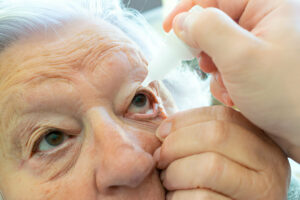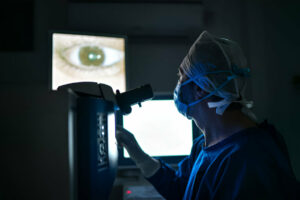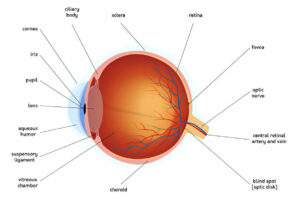
Cataracts deprive many people of clear vision, which has an adverse impact on quality of life. If reduced vision has made daily tasks such as work or travel more challenging for you, now may be an opportune time to consider cataract surgery.
After cataract surgery, recovery is typically quick and uncomplicated; you should be back to most normal activities as soon as your doctor approves.
Wait at Least a Week to Fly
Cataract surgery is a safe and effective procedure that replaces your natural lens with an artificial one, in less than an hour, often leading to improved vision for many patients. But, before going under the knife it’s essential that you understand your recovery timeline and set realistic expectations; that way you’ll be prepared for when it’s time for takeoff again.
Your doctor may advise waiting at least a week after cataract surgery before flying, to allow your eyes to heal properly and possibly reduce complications such as bleeding in the eyes or perforation. An ophthalmologist can also help assess if air travel is safe after cataract surgery depending on factors like your line of work and any additional surgical complications which may have arisen.
If you are travelling soon after surgery, having someone assist at home for the initial few days could be extremely useful. With your vision likely being foggy, assistance in getting around and taking medication could prove crucial. Furthermore, sleeping or napping while wearing an eye shield could prevent accidental rubs on the surgical site as well as using caution when showering to avoid splashing directly into your eye.
Resuming most regular activities after uncomplicated cataract surgery typically takes only days, though your ophthalmologist may have additional instructions for you, including taking it easy and avoiding strenuous activity. If your work requires physical labor, however, it is wise to discuss your recovery timeline and possible accommodations that could help until you feel ready to return to work.
Cataracts may be a widespread condition, but their severity varies for every individual. If decreased vision has rendered you incapable of performing daily living activities you enjoy or you rely on others for transportation and other tasks, cataract surgery might be worthwhile. Timing will vary for every person but most individuals seeking to remain engaged in activities they love will find having their cataracts removed as soon as possible beneficial.
Don’t Drive
Cataracts can impede on many daily tasks, including driving. Your vision may become cloudy or blurry over time; cataract surgery is available to restore clear sight; however, until your doctor approves you to drive again it should remain safe to do so.
Cataract surgery is performed as an outpatient procedure at an eye clinic, where your surgeon will administer eye drops to dilate your pupil and give you local anesthetics or possibly even sedatives in order to keep you calm during an hour-or-so procedure that involves replacing your cloudy lens with one made from synthetic plastic material and thus improving both visual acuity and decreasing dependency on glasses or contacts.
After your procedure, you will spend some time in a recovery room where nurses will monitor your condition and answer any of your queries. At this time, someone must drive you home as the effects of anesthesia may still make you groggy.
Home is where rest and recovery should occur; any activity that strains your eyes should be avoided. When leaving the house, ensure you wear protective sunglasses to shield from harmful light rays; additionally take special care not to rub or get any water into your eyes.
Make sure that you use any medicated eye drops prescribed by your physician as directed, to protect from infections, control pressure and reduce inflammation in the eye. Use as directed and don’t discontinue them without prior consultation from a healthcare provider.
Driving after cataract surgery can be hazardous, potentially leading to serious injury if you haven’t completely healed from the procedure. Glare or visual impairments could hinder your vision on the road and studies have indicated an increase in near misses and crashes that could cause serious harm or death.
Avoid Swimming or Hot Tubs
After surgery, it may seem counter-intuitive to limit water exposure, but it’s essential to remember that bacteria found in swimming pools, hot tubs and even showers could aggravate your cataract by entering through its surface and entering through your eye to cause infection that will delay recovery time.
Swimming or using a whirlpool bath should also be avoided until cleared by your physician, as both activities can increase pressure on the eyes, slowing recovery. Showering for at least a week post surgery should also be avoided in order to prevent soapy hands rubbing your eyes while showering.
At home, it is also important to avoid getting water in your eyes by wearing a shower cap or covering the area around them with a clean towel – this can prevent bacterial infections from developing in your eye and it is also vital that you don’t rub your eyes as this could dislodge a corneal flap created during surgery, leading to irritation, tear production and other postoperative complications.
As part of your recovery period, it will be necessary for you to use prescribed eye drops several times each day as per the directions from your physician. Failure to adhere strictly could slow the healing process down further. In addition, wearing sunglasses when going outside could protect your eyes from harmful UV rays that could irritate them as they heal.
As you recover from cataract surgery, it is advisable to take frequent breaks from screens and visual activities in order to reduce eye strain caused by prolonged reading or screen time. Adjust font sizes on electronic devices so they are larger as well as use over-the-counter eyedrops if your eyes feel dry.
After your procedure, be prepared to stay home from work for at least a week depending on your type of job and doctor’s instructions. Arrange for someone to serve as your designated driver so that driving doesn’t become part of your daily life during this time.
Wear Sunglasses
Cataract surgery requires making a small incision to extract and replace cloudy lens with artificial plastic lens. The operation typically lasts less than 30 minutes, and you should return home several hours postoperatively. To protect eyes from UV rays it is vital that patients wear sunglasses.
Soon after cataract surgery, most people return to normal non-strenuous activities quickly. However, it is essential that any strenuous activities which require rubbing of the eye, contact with dirt, sweat, or dust, or require swimming or hot tubs be avoided for two weeks post surgery; if these activities cannot be avoided tape an eye shield over each eye in order to prevent unintended rubbing during recovery period.
If you plan to return to work shortly after cataract surgery, it’s essential that you speak to your employer and discuss a modified schedule or accommodations. Furthermore, having someone drive you could help alleviate stress during this initial recovery phase.
After cataract surgery, vision can gradually improve depending on the lenses implanted. A small crescent-shaped shadow may initially appear at the peripheral side of your vision and will usually subside over time. Most patients will still require reading glasses for close up work while many require distance correction as well.
Cataract surgery can greatly enhance your quality of life by providing clearer vision. To achieve optimal outcomes from cataract surgery, it is crucial that you follow all instructions from your eye doctor and allow enough time for full recovery after cataract surgery. Hydration, healthy food choices and nutritional supplements play a pivotal role in the healing process.














